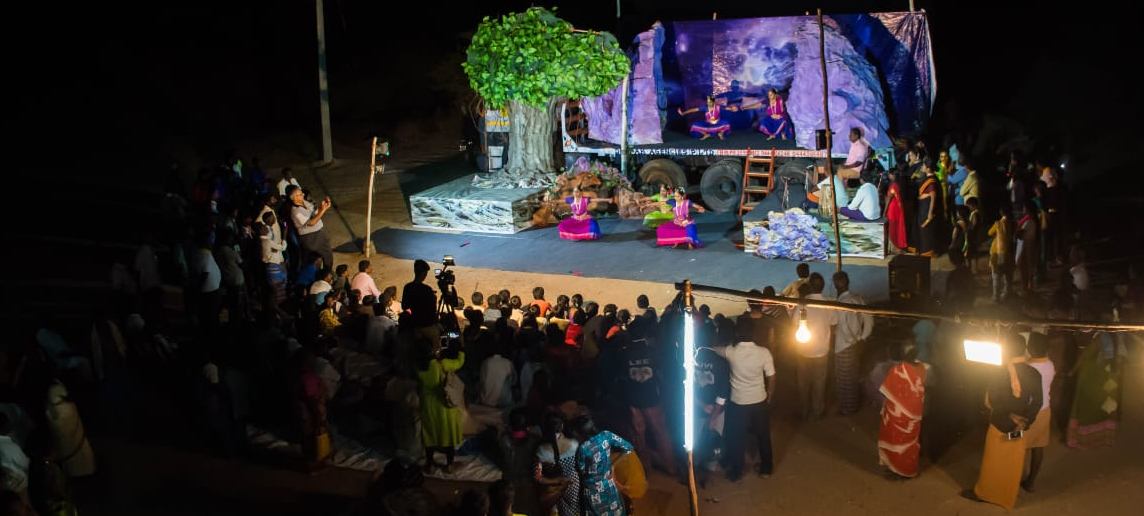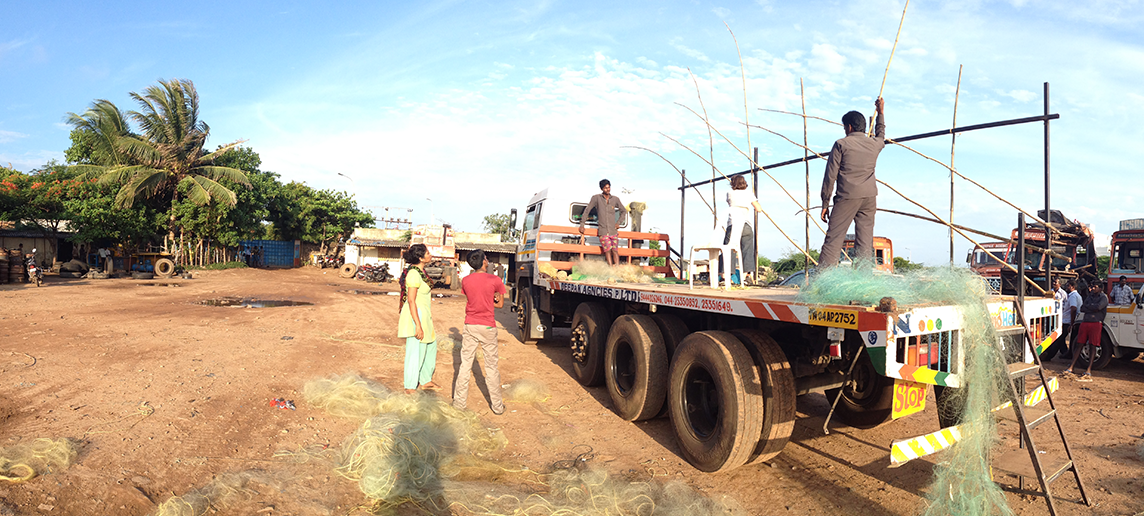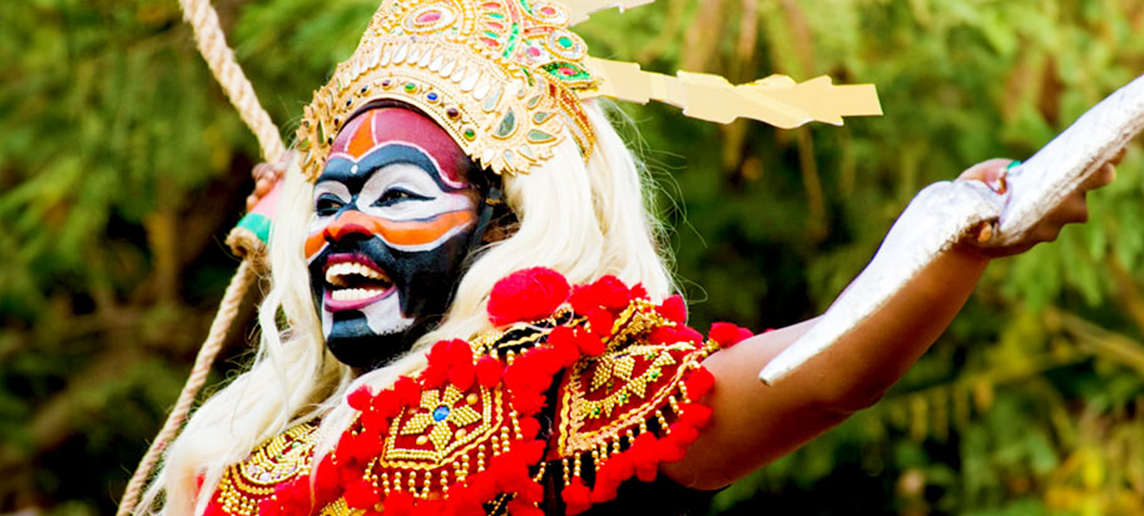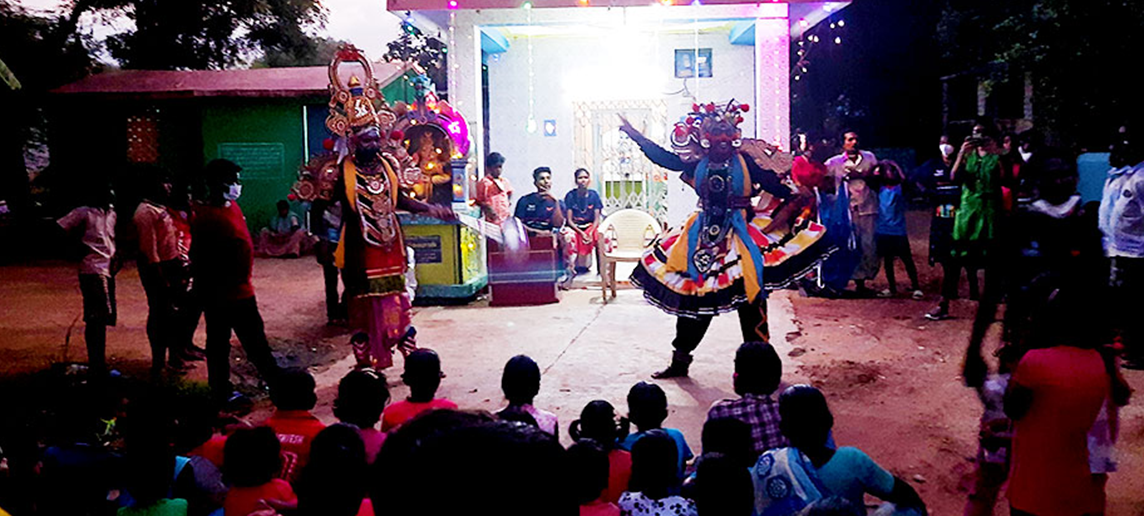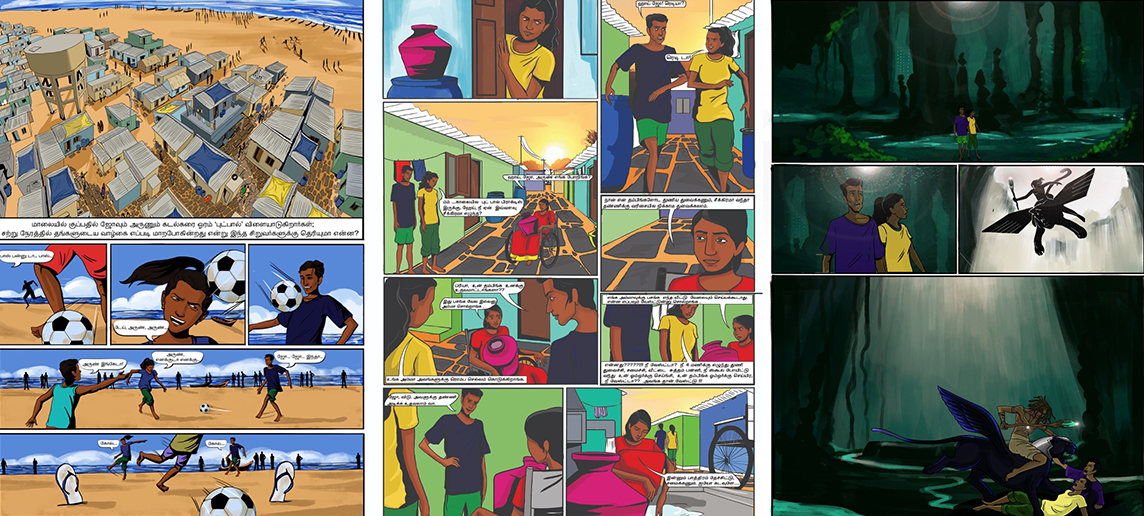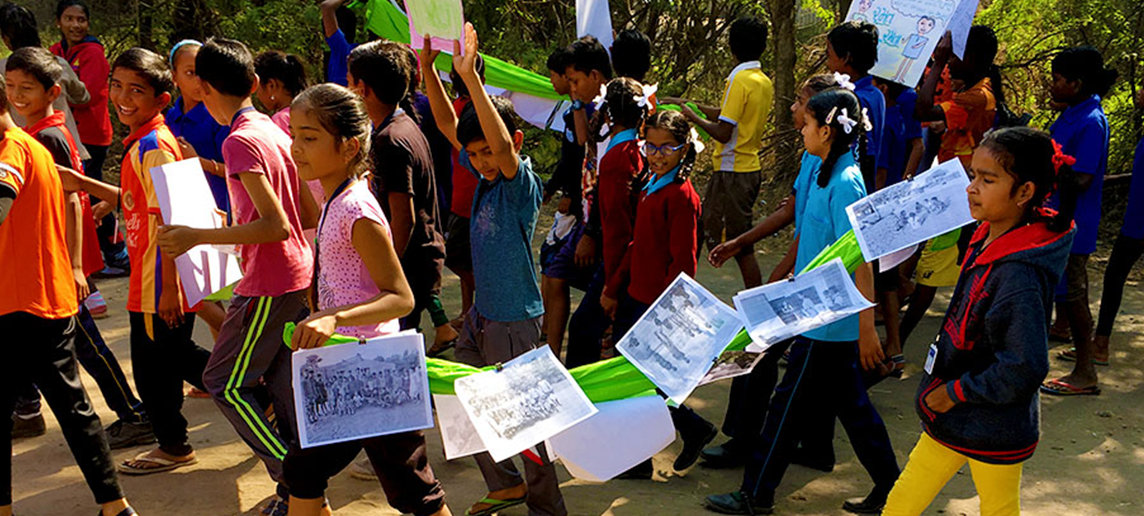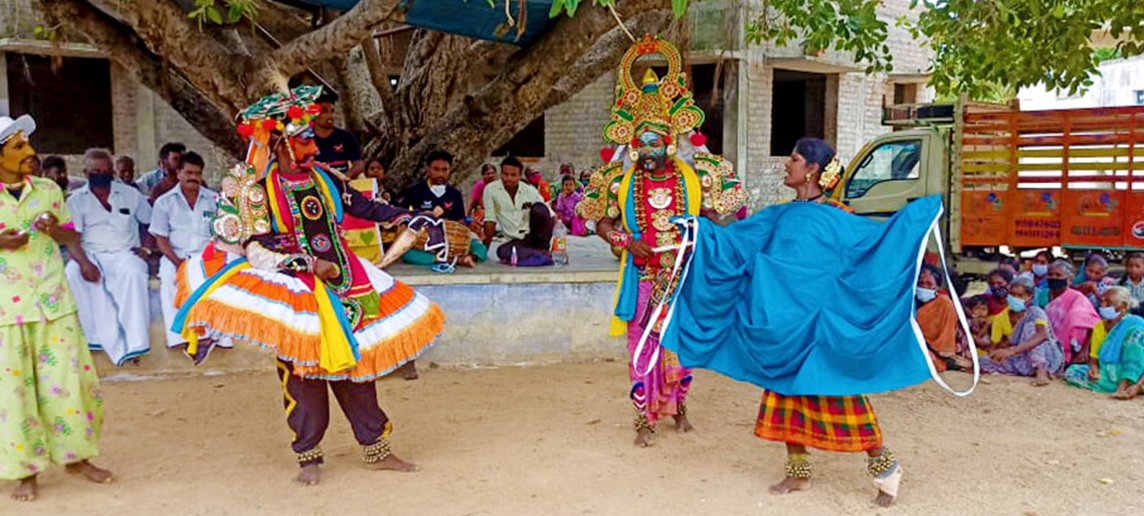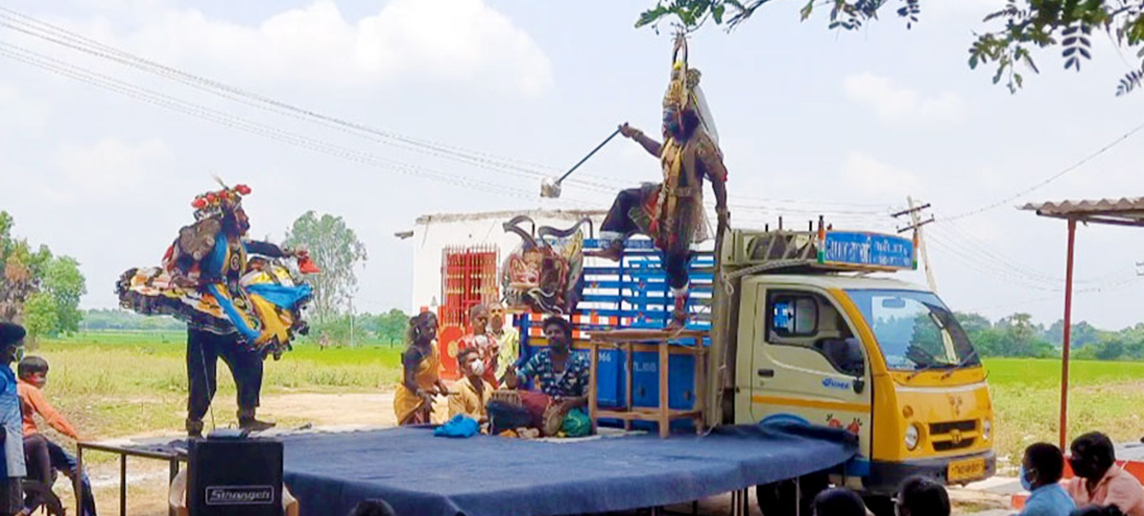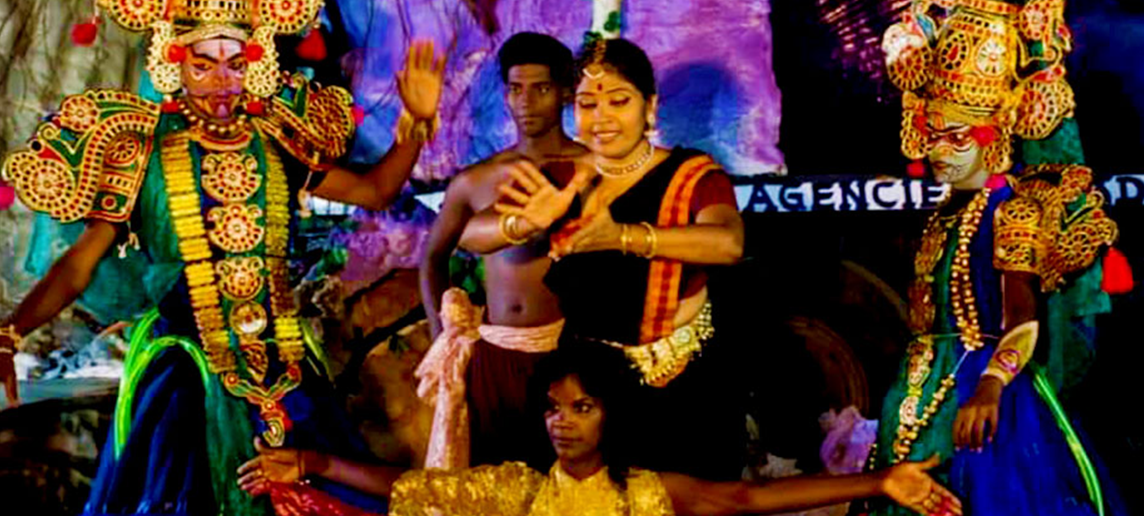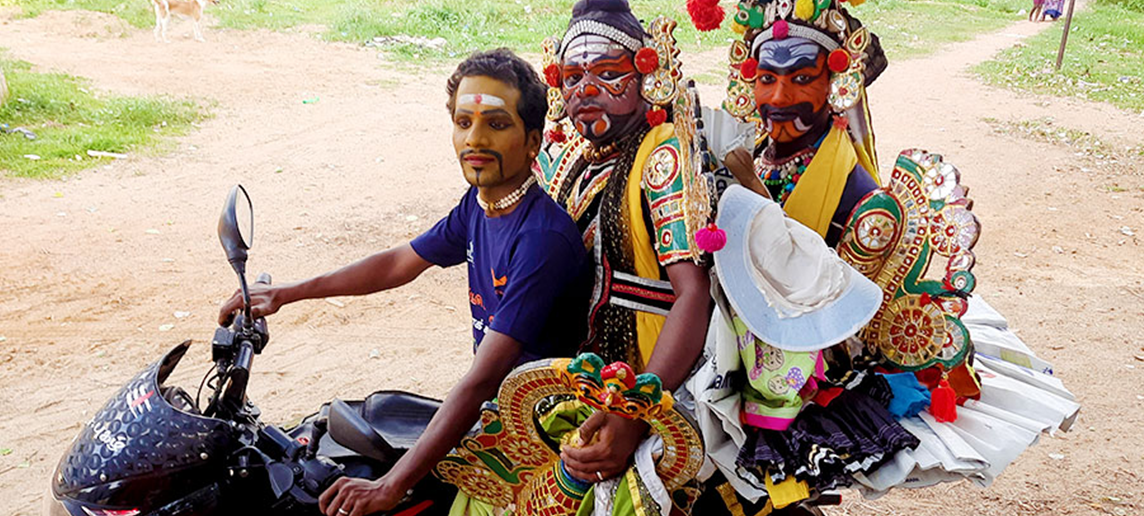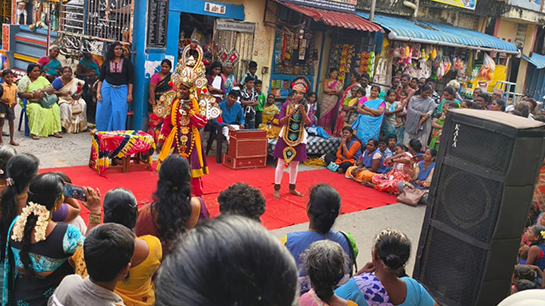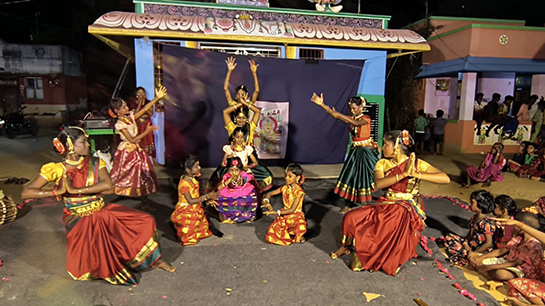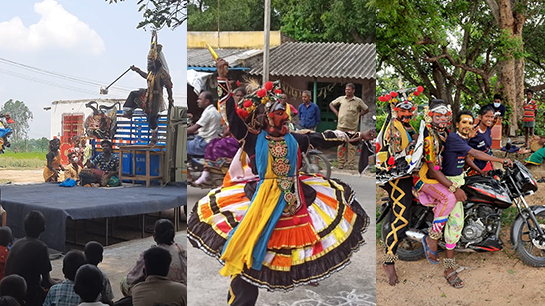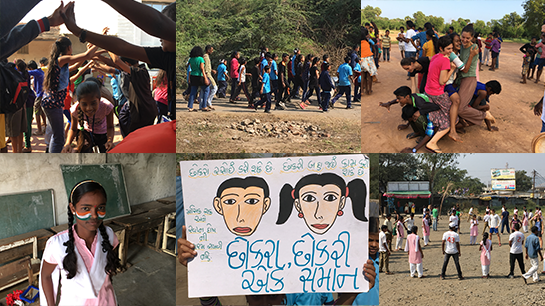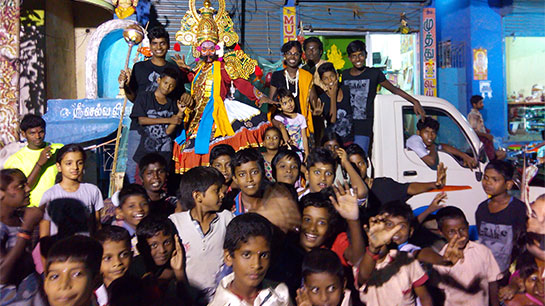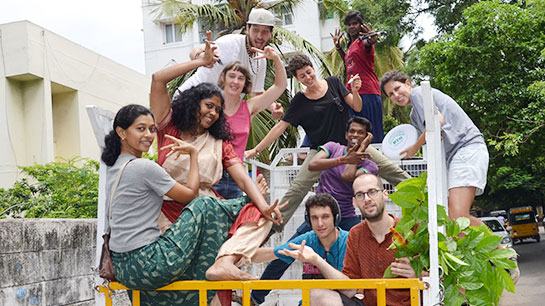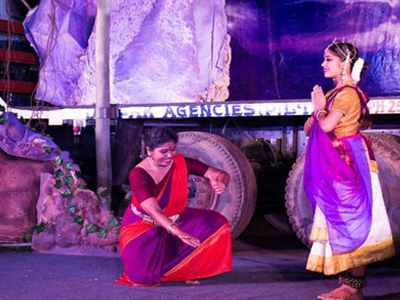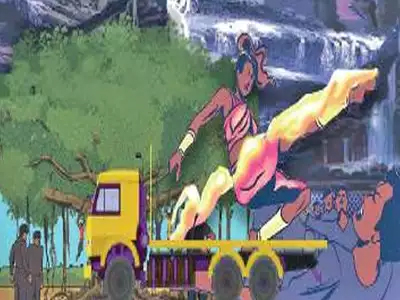Signature Programmes
Lorry Lolakku
A lorry becomes a stage - a travelling theatre where stories come alive through traditional performing arts. Each Lorry Lolakku project brings together Katradi’s artists and different communities, co-creating performances around various themes of social justice through dance, theatre, photography, and installation art. We celebrate their spaces, record their experiences, and build a one-of-a-kind show on a truck that then journeys to other communities, carrying their voices with it.

Lorry Lolakku has showcased and supported traditional and marginalised art forms like Kattaikkuttu, Parai, Oyilattam, Oppari, and more - bringing high-quality art to people who may be seeing it for the first time, and ensuring these vibrant forms continue to thrive.
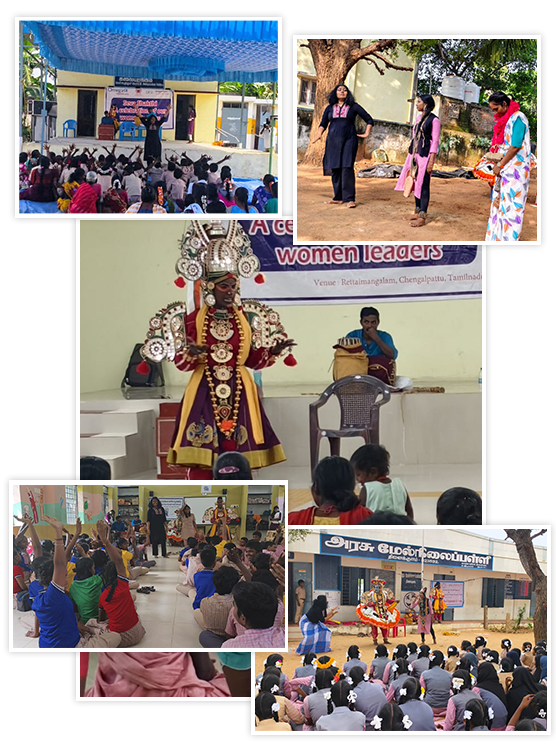
Lorry Lolakku 2025: Gender-Based Violence
Pengal Oru Baaram Aa?
In January 2025, our Lorry Lolakku performances sparked a movement for social change across three different venues. With each location hosting two performances each.
In North Chennai, in partnership with Arunodhaya Centre for Street and Working Children, the morning session at Royapuram Government School engaged students from Classes 8 and 9. The event opened with a graceful Bharatanatyam Pushpanjali, followed by interactive exercises led by Sangeeta Isvaran. The performance tackled gender inequality head-on, inspiring a powerful moment when a young girl from the audience passionately declared to one of the actors, “Say no! Just say no! Don’t accept [the injustice of tradition]!” This call resonated deeply, prompting thoughtful discussions on the unequal expectations placed on boys and girls.
The afternoon session at a nearby community space extended this conversation to parents, teachers, and local residents. The focus shifted to financial independence, decision-making power for women, and the pressures restricting girls’ ambitions. Community members actively participated, sharing personal stories and highlighting the need for collective change. The engagement was deep and personal, reinforcing the urgency of these issues.
In Chengalpattu, in collaboration with the Association for Sustainable Community Development (ASSCOD), our performance in Vellaputhur saw Sangeeta Isvaran build strong rapport with the audience through engaging exercises and poignant dialogues. Topics such as early marriage, girls’ education, and the limitations imposed on young women were explored. The play, which featured a dramatic portrayal of Arjuna striking Queen Alli, ignited strong emotions among the audience. Discussions flowed on the unequal treatment of women - from the hypocrisy of calling wives the “center of life” while subjecting them to violence, to the barriers that restrict girls’ education. Personal testimonies shared by audience members underscored the urgency of addressing early marriage and limited opportunities for girls.
Later, in the afternoon session at Kaliyampoondi Village, interactive activities - ranging from ice-breaking exercises to candid group discussions - allowed community members and school children alike to reflect on issues of self-care, social restrictions, and the need for change. By the end of the performances, several girls openly shared their dreams of pursuing education despite family pressures, while elders reflected on how cultural restrictions have shaped their own lives. The exchange between generations was particularly moving, paving the way for continued dialogue within the community.
At Ramanathapuram, in partnership with Voluntary Association for Peoples Service (VAPS), the morning performance at Thinaikulam Government High School introduced many to Kattaikkuttu and Bharatanatyam for the first time. The session featured a dynamic portrayal of gender roles, encouraging open dialogue among students and teachers about financial independence and educational opportunities for girls. There was also a discussion on the harmful impacts of alcohol on people's minds and bodies.
The afternoon session was in Mothivalasai Village, held at a local community venue. The impactful conversations continued through interactive exercises that brought to light everyday challenges, from access to education and financial independence to the pressures of traditional norms. Given the younger members in the audience, Sangeeta Isvaran adjusted the performance, incorporating more comedy and physical movement.
Across these venues, our performances not only entertained but also ignited critical dialogue, empowering communities to question long-held beliefs and envision a more equitable future. The enthusiastic audience engagement - evidenced by candid discussions, emotional reactions, and calls for change - reinforces our commitment to using art as a catalyst for social transformation.
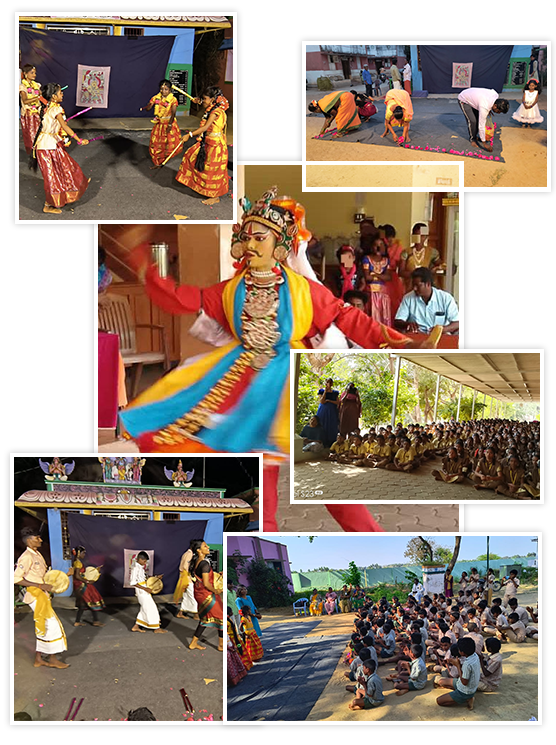
Lorry Lolakku 2024: Girls' Empowerment
This year, Lorry Lolakku was initiated in Murusi, Trichy, where we conducted a six-month life skills development programme for the children at a local children's home. This programme featured innovative sessions on self-awareness, healthy communication, societal power dynamics related to gender and caste, menstruation, reproductive health, media influence, and envisioning a bright future. These topics addressed the many challenges girls face, limiting their opportunities in life.
Katradi facilitators engaged the children in extensive discussions, asking them to identify the most important lessons from the six-month programme they wanted to share with their peers.
The key issues they highlighted were:
- - The impact of alcoholism on families and society
- - Menstruation and breaking cultural stigma
- - The importance of girls' education and the barriers hindering it
- - Empowering girls to imagine and strive for a bright future with the support they need

As part of the life skills development programme, the children created a performance to showcase these important learnings. The creation and execution of this performance were a grand success, thanks to the tremendous efforts of Thilagavathi Palani, Moogambigai Murugesan, and the exceptional talent of the children.
The storyline was lively and compelling, featuring a young girl forced to drop out of school and treated as a burden, with her family solely focused on marrying her off. With the help of two genies, Jinganaka and Janganaka, the girl navigates challenges. The performance also spoke about menstrual stigma, gender-based violence, and physical abuse by alcoholic fathers. The script was vibrant and the girls did a fantastic job of writing it, addressing various issues they face.
The performance was so successful that we encouraged the children at the Katradi Centre to further develop the theme. This resulted in an improvised performance at Mettu Mulluvadi Middle School for an audience of 100. Additionally, the children performed for the Boom Boom Mattukarar community in Sagayapuram, reaching an audience of 500. Our mission at Katradi has always been to support marginalised communities, and the tribal community in Sagayapuram holds a special place for us. During COVID, we supported them to the best of our ability, and now bringing this performance to them, addressing the challenges faced by girls, was a deeply fulfilling experience.
Lorry Lolakku 2022: Leprosy and Anaemia
Ennai Verukaadheer
Lorry Lolakku 2022 emerged from a meeting with a health official from the Vellore collectorate, addressing the neglect of various health issues amidst the COVID-19 pandemic. This initiative aimed to de-stigmatise leprosy and raise awareness about anaemia through artistic performances, highlighting the importance of health education and community engagement.
Promoting Leprosy Awareness:
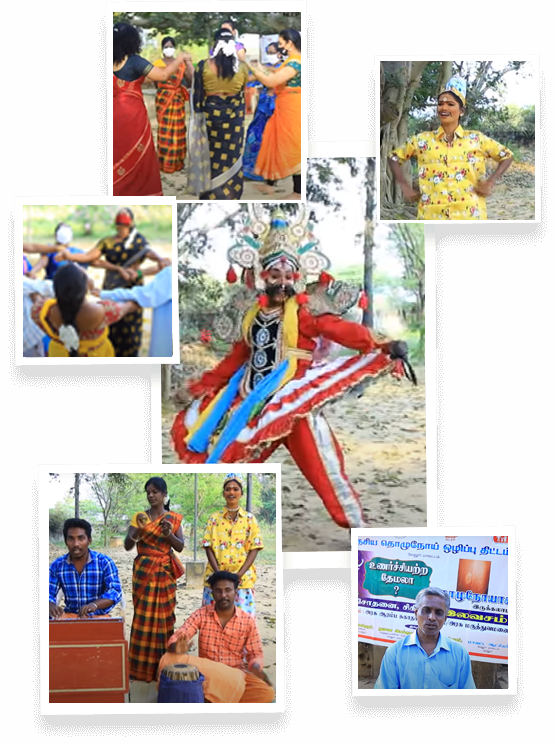
Leprosy is still prevalent in India and due to the stigma attached to this dreaded disease, people are not aware that it is eminently curable especially if caught early on. But because of the fear of ostracisation, people don’t report the symptoms and this leads to further spread as well as severe consequences such as amputation.
In response to a request from the Vellore Collectorate to raise awareness about leprosy on World Leprosy Day (January 30th), Katradi created a performance in the Kattaikkuttu style which was staged at Shanti Gram - a sanctuary for individuals affected and orphaned by leprosy. It provided us with an opportunity to directly connect with leprosy survivors, fostering empathy and understanding. Beautiful songs were written to de-stigmatise leprosy, to raise awareness of the early symptoms, increase reporting and urge people not to ostracise leprosy survivors. The Kattaikkuttu performance was inserted into a variety cultural show to engage the inhabitants of Shanti Gram that included Gummi (traditional Tamil folk dance), Bharatanatyam and devotional singing. The performance was recorded and shared on YouTube by the Vellore Collectorate, effectively reaching a broad audience across Tamil Nadu. The time spent at Shanti Gram with those abandoned by their families, added a deeper sense of purpose and meaning to the initiative.
Addressing Anaemia:
Recognising the high prevalence of anaemia among women in India, Katradi expanded its focus to raise awareness about this condition. A tailored Kattaikkuttu performance was developed to educate communities on the causes, symptoms, and treatment of anaemia. This informative performance was showcased in three villages, aiming to sensitise the local population about anaemia and promote dietary practices necessary for effective prevention and management.
Lorry Lolakku 2022 effectively utilised art and performance to promote health awareness in Vellore and beyond. By creating engaging performances on leprosy and anaemia, the initiative successfully reached diverse audiences through digital platforms and live village shows. Katradi's efforts have made a significant contribution to closing the health awareness gap and empowering communities to take control of their well-being.
Lorry Lolakku 2021: COVID - 19 Vaccination Drive
This mega Lorry Lolakku reached 36,500 beneficiaries, with a notable vaccination rate of above 85% in the 8 target villages and an outreach to a total of 83 villages. The efforts resulted in the distribution of 1,788 rice bags and the organisation of 29 vaccination camps and 19 Lorry Lolakku performances. An additional 50 all-night performances, integrating the project's message, were staged by other drama companies.
Lorry Lolakku 2021 was set in motion amidst the tumultuous backdrop of India's devastating second wave of the deadly COVID-19 pandemic. As the virus claimed the lives of millions, the availability of vaccines was overshadowed by widespread fear and hesitancy among the people. Fake news and a lack of trust in government systems perpetuated this apprehension.
Katradi recognised the need of the hour and embarked on a mission to spark discussions and promote awareness about COVID-19 and the vaccines with CSR funds from BI Worldwide and the support of Give India Foundation. We devised an action plan employing a multi-pronged approach to reach as many people as possible. The basic strategy was to spread awareness about vaccines through performances and group discussions, thus incentivising a significant percentage of the population to vaccinate, including key leaders. The theory was that this would tip public opinion and the rest of the population would vaccinate themselves of their own accord. This theory was fulfilled as this pattern of behaviour was observed across the four-month programme.
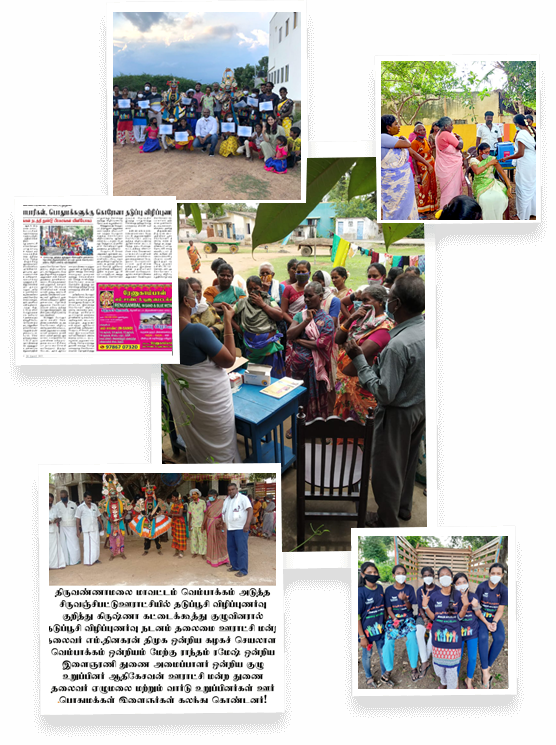
Additionally, Give India Foundation carried out extensive Monitoring and Evaluation of the effort which resulted in an independent assessment of the project and all the statistics mentioned here.
Initially 5 villages where vaccine hesitancy was observed to a large extent were chosen to be part of the programme.
These villages Mettu Mulluvadi, Palla Mulluvadi, Pudur, Kalavai Kootroad (Scheduled Caste community), Ladavaram (Irular Tribal Community) were first surveyed through a baseline study to assess the people’s attitudes and their perceptions on vaccination. It was important to know the reasons - the beliefs people held over vaccination that needed to be addressed to change their attitude and encourage them for vaccination. The survey threw light on many of the ill-informed myths and beliefs, related to health, adverse side effects. E.g. The vaccine has dangerous side effects, avoiding onion garlic in diet will not lead to COVID-19 etc.
With this information we designed a multi-pronged strategy including various initiatives: Beautiful, colourful performances in the traditional Kattaikkuttu style in the form of ‘Lorry Lolakku' were carried out village to village in the district. Along with these several awareness talks and meetings were carried out to give proper information about vaccines and its role in protecting them and their community. Door-to-door visits were also made in communities selected for the programme to reach out to people and explain to them the importance of having vaccines.
On the other hand, the team also worked with the state health functionaries to organise camps in and around the target villages to let the people who are sensitised get the vaccine shot. Rations were distributed as an incentive to help compensate them for the wages lost as they rested to recover from the effects [if any].
1. Lorry Lolakku Mobile Live Performances:
Katradi utilised arts, theatre, and music to disseminate information about COVID-19 protocols and vaccines. Collaborations with other music and theatre groups facilitated open dialogues, debunking fake news and addressing vaccine concerns.
Mobile performances in the Kattaikkuttu style were designed to educate and entertain audiences about COVID-19 and vaccines. Humor and comedy were utilised to make difficult topics more approachable. The performances sparked conversations about lifestyle diseases and addressed specific concerns raised by the audience. Recordings of the performances were shared via WhatsApp, reaching people across Tamil Nadu. Collaboration with other Kattaikkuttu and drama companies to embed 15-minute segments about COVID 19 and the vaccine in their all-night performances extended the project's reach to more than 75 villages. Often these all-night performances would have 800 to 1000+ audiences.
2. Creating Spaces for Discussion:
Focus group discussions, the formation of a team of volunteers and door-to-door visits were conducted to extend the reach of the project's message. Correct information about COVID-19 and the vaccine was disseminated and discussed, encouraging informed decision-making.
The project formed a dedicated volunteer group called 'Kakkum Karangal' (Helping Hands in Tamil) consisting of 35 fearless young people who carried out activities in villages, often risking their own lives. Katradi engaged in focus group discussions and door-to-door visits to personally explain the importance of vaccines. The traditional drumming art form of Thandora was used to announce the Lorry Lolakku performances, generating curiosity and discussions about COVID-19, the vaccine and the project's goals. Young volunteers bravely spread awareness through Thandora, despite potential social backlash. Older volunteers provided support and drove the project forward.
3. Compensatory Gestures:
Katradi offered compensation, such as 10kg bags of rice and ration kits, to individuals who chose to get vaccinated. Often side effects like a slight fever or headache prevented people from working for a couple of days. Since they are daily wage earners, these rations kits compensated them for the potential loss of pay for those 2 days.
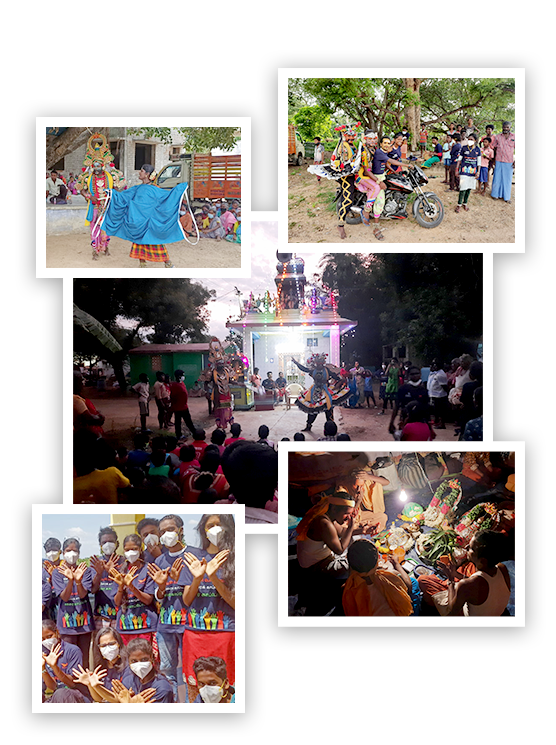
4. Multimedia Content Creation:
Posters, video memes, and other multimedia content were designed to spread accurate information and debunk myths surrounding COVID-19 and vaccines. Data collected through door-to-door visits enabled the creation of colorful WhatsApp memes, texts, and videos to disseminate accurate information and foster appreciation for vaccines.
5. Partnership with Government Vaccine initiatives and co-ordination with district authorities:
The Katradi team had continuous meetings with Doctors to explain their programme and idea behind the performances. The meetings were held to work with officials to hold more camps, have coordinated efforts with the Katradi team, get support on data, support for assessing co-morbidities and follow ups. The Katradi team built a very good rapport with the district authorities to combine their awareness programme with those of the district authorities and use the district system to have knowledge of when and where camps were planned beforehand to keep people ready and guide them to the nearest vaccination camp, depending on stock and availability. Katradi diligently partnered with doctors to leverage their mega vaccine camps. Additionally, we organised dedicated vaccine camps in villages where significant vaccine hesitancy was observed. This proactive approach aimed to address the concerns of those communities and ensure broader vaccination coverage.
6. Telephone services to encourage people to vaccinate:
Apart from people who attended the camps organised by Katradi, many called our volunteers and youth leaders to find out where to get vaccinated. The performances and focus group meetings played a big role in demystifying vaccines, when people lost their fear they were willing to get vaccinated but were sometimes unable to find vaccine camps near their area. Since the Katradi volunteers had gone to many villages and campaigned for correct information about COVID-19 and vaccines, many called them [and continue to call them] to get information about the camps.
7. Posters for awareness
Posters were stuck for creating awareness on COVID vaccination. As a strategy, in the initial phase of the programme, when vaccine hesitancy was significant in the villages, in every village, post the camp, a poster to honour the first people who took the shot was put up, with the photos of those who had taken the vaccine.
Adding new villages and targets
Soon we had people coming in from other villages requesting us to include their communities in the programme. New villages had to be added to the primary 5 villages and more villages brought under the fold of the programme. The targets were kept varied for different villages.
| Type of village | Villages selected | Progress Tracking |
|---|---|---|
| Primary Villages | Mettu Mulluvadi, Kalavai Kootroad (SC community), Palla Mulluvadi, Pudur, Ladavaram (Tribal Community) | Tracking for vaccination at 60% target |
| Secondary Villages | Panamugai, Pulivalam, Sonaipattu | Tracking for vaccination at 50% target |
| Tertiary Villages | Randham (SC community), Seruvanchipattu, Durairajainagar (Ranipet), Sellaneri, Mecheri, Kurumudithangal, Irumaram, Natteri, Kuthanoor, Brahmadesam, Keezhpuduur, Kuthanoor, Kizhperamanallur, Tozhuthavur, Anbogi, Arani, Nagaleri, Uliya Nallor, Perunagar, Vembi, Sirukarumbur, Kaveripakkam, Alathur, Malaippattu, Vanniyavedu | Tracking but not set against any target vaccination |
By the end of the programme we had achieved over 85% vaccination in these target villages, over and above our goal of 60% and 50%. And through our performances we reached out to more and more villages over and above the primary, secondary and tertiary villages.
Appendix
Final vaccination status in villages
| Village | Adult Population | Previously vaccinated before start of programme | Vaccinated in Katradi camps | Vaccinated outside since the programme started | Total Vaccinated | %Vaccinated |
|---|---|---|---|---|---|---|
| Mettu Mulluvadi | 846 | 0 | 212 | 540 | 752 | 88.89 |
| Kalavai Kootroad (SC) Community | 323 | 45 | 120 | 125 | 290 | 89.78 |
| Palla Mulluvadi | 686 | 121 | 193 | 314 | 628 | 91.55 |
| Pudur | 526 | 98 | 216 | 175 | 489 | 92.96 |
| Panamugai | 798 | 146 | 203 | 334 | 683 | 85.58 |
| Pulivalam | 587 | 208 | 138 | 175 | 521 | 88.75 |
| Sonaipattu | 678 | 282 | 78 | 227 | 587 | 86.57 |
| Ladavaram | 92 | 0 | 79 | 79 | 84.95 |
Month-wise vaccination status in Katradi intervention camps
| Village | July | August | September | October | Total |
|---|---|---|---|---|---|
| Mettu Mulluvadi | 70 | 30 | 58 | 0 | 212 |
| Kalavai Kootroad (SC) Community | 83 | 37 | 0 | 0 | 120 |
| Palla Mulluvadi | 89 | 8 | 96 | 0 | 193 |
| Pudur | 97 | 79 | 40 | 0 | 216 |
| Panamugai | - | 53 | 104 | 46 | 203 |
| Pulivalam | - | 44 | 94 | 0 | 138 |
| Sonaipattu | - | 0 | 78 | 0 | 78 |
| Ladavaram | 0 | 0 | 0 | 0 | 79 |
| Month | No. of Vaccine camps assisted | Villages |
|---|---|---|
| July | 6 | Mettu Mulluvadi, Pudur, Palla Mulluvadi, Kalavai Kootroad |
| August | 14 | 0 |
| September | 7 | Mettu Mulluvadi, Palla Mulluvadi, Pudur, Panamugai, Pulivalam, Sonaipattu |
| October | 2* | Ladavaram |
*One camp was organised at the last minute by district officials, where on the day of the camp Katradi staff could not be there, but the meetings, follow-up, awareness activities up to the camp were done by Katradi.
Rations
distributed month-wise:
These were donated by many
different groups apart from our main funder BI Worldwide.
| Month | No. of Rations disributed |
|---|---|
| July | 850 |
| August | 330 |
| September | 458 |
| October | 150 |
Awareness activities month wise status:
| Activity | July | August | September | October |
|---|---|---|---|---|
| Group Meetings (Awareness talks) | 14 | 5 | 8 | 2 |
| Door-to-door visits | 40 | 3 | 4 | 0 |
| Performances | 33 | 15 | 11 | 0 |
| Thandora | 12 | 15 | 6 | 2 |
| Total | 79 | 37 | 27 | 2 |
Break up of Lorry Lolakku and All-Night performances:
| Activity | July | August | Sept | Oct | Total No. of Spectators |
|---|---|---|---|---|---|
| Lorry Lolakku | 4 | 6 | 9 | 0 | 6,225 |
| All-night performances | 29 | 19 | 2 | 0 | 29,830 |
Performance groups partnered with for all night performances:
| Activity | Total No. of Spectators |
|---|---|
| Sri Krishna Kattaikkuttu Company | 8,900 |
| Sri Muthumariyamman Natagamanram | 5,100 |
| Kanchi Sri Gowri Natagamanram | 5,230 |
| Sri Murugan Natagamanram | 3,750 |
| Seetha Natagamandram | 6,850 |
| Total no. of spectators | 29,830 |
Awareness Activities
| Month | Villages |
|---|---|
| July | Mettu Mulluvadi, Pudur, Kalavai Kootroad |
| August | Mecheri, Kurumudithangal, Ladavram ,Pudur |
| September | Palla Mulluvadi, Mettu Mulluvadi, Natteri, Pulivalam, Panamugai, Sonaipattu |
| October | Ladavarm |
| Total awareness group talks: 29 |
Door to Door visits
| Month | Villages |
|---|---|
| July | Mettu Mulluvadi, Pudur, Kalavai Kootroad, Palla Mulluvadi |
| August | Mettu Mulluvadi, Palla Mulluvadi, Kalavai Kootroad |
| September | Mettu Mulluvadi, Kalavai Kootroad, Pudur |
| October | Ladavaram |
| Total | Total door-to-door - 47 |
Lorry Lolakku performances
| Month | Villages |
|---|---|
| July | Mettu Mulluvadi, Palla Mulluvadi, Kalavai Kootroad, Nagaleri |
| August | Pudur, Kuthanoor, Seruvanchipattu, Randham (SC community), Durairajajinagar (Ranipet), Sellaneri. |
| September | Melputhupakkam, Melapanthai, Vazhapanthal, Kalavai bus stop, Kalavai Angalamman temple, KalavaiIrular community, Natteri, Panamugai, Pulivalam |
| Total | Total Lorry Lolakku -19 |
All-Night performances
| Month | Villages |
|---|---|
| July | Vanniyavedu, Poojoloi Nagar, Somanthangal, Mosur, Manamathurai, Ochalam, Kizvithi, Uluthai, Santhanakotta, Munukapattu, Perupilimpattu, Malaipattu, Redio Mangadu, Alambundi, Oyalai, Sattathangal, Ramapuram, Laalapettai, Buthamangalam, Sirukurambur, Kaveripakkam, Alathur, Kizakka Medu, Dhanakkotipuram, Perunagar, Thiruvadiyapuram, Uliya Nallor, Vembi |
| August | Pilappoour, Molachur, Kuripedu, Kalarpalaiyam, Illodu, Mattadhari, Kalavai Kootraod, Kuadlur, Arani, Elangadu, Rajampuliur, Thurkam, Narasmangalam, Kuripedu, Thiruppanankadu, Keezhpudur, Kizhperamanallur, Thozhuthavur, Anabogi |
| September | Kattupakkam, Pennagar |
| Total Night performances- 50 |
Lorry Lolakku 2020: Combating COVID-19

Lorry Lolakku 2020: Combating COVID-19
During the early stages of the pandemic, the government realised that people were not comprehending the nature of COVID-19 and its mode of transmission, there was also a lot of fake news creating misinformation and panic. Many individuals neglected to follow protocols such as wearing masks and adhering to lockdown measures. The Tehsildar of The Arkot Taluka approached us, expressing concern about the widespread disregard for government regulations in the surrounding villages of Kalavai Kootroad. She requested us to create mobile live performances with proper police protection to ensure that people maintained social distancing while attending the shows.
Lorry Lolakku was performed in open-air spaces at the heart of each village, catering to small audiences. The performances featured Kattaikkuttu songs with lyrics centered around COVID-19. The script ingeniously personified the Corona virus in a conversation with Yama Dharma Raja, the god of death and justice. Through this dialogue, Yama conveyed the message that while we will all eventually face death, the virus was accelerating our demise. Yama emphasised that by taking proper precautions, we could assist him in defeating the virus. The performance creatively incorporated a mask as a substitute for the traditional curtain, along with various humorous props. The comic routine of the 'kattiyakaaran' or jester effectively embodied the fears and concerns of the people, resonating well with the audience.
These performances were recorded and shared via WhatsApp, significantly expanding the reach of the message. Due to the restrictions imposed by full and partial lockdowns, the live audience capacity was limited, making the recorded performances instrumental in reaching a broader audience. The government authorities collaborated closely with us throughout this initiative, greatly appreciating the efforts of the performers. Following the performances, discussions were held, often featuring local doctors and the Tehsildar, who answered questions from the public about COVID-19. Using colour, humour, music and dance, these interactions helped dispel misinformation and prevent widespread panic.
Furthermore, we encouraged individuals to come forward if they experienced symptoms of the virus, as many previously concealed this information out of fear of being isolated. Detailed information was provided regarding isolation procedures and people were assured that the government would take care of them at the isolation centers. They were promised adequate nourishment, communication with their families and reassured that their well-being would be ensured.
Mega Lorry Lolakku 2018-19: Menstrual Stigma & Child Marriage
Vetri
Funny Skeleton song about menstruation
Lorry Lolakku 2018-19 was a whopping, one of a kind event mounted on the back of a 20-foot long lorry. This project was designed specifically to throw light on the issues that teenagers growing up in Tamil Nadu face - the stigma attached to menstruation and nightfall, sex abuse, lack of sex education, oppression of girls, child marriage and more. It was important for us not to discriminate between the sexes when it came to addressing the dearth of accurate information or acknowledgement of problems that youth face during puberty. Sangeeta Isvaran, founder of Katradi, decided to write a comic book called 'Vetri' that introduced concepts of gender, reproductive health, gender-based violence, bringing much needed lightness to topics that require normalising. All of this was achieved through a fun, accessible and inclusive medium of a comic book.
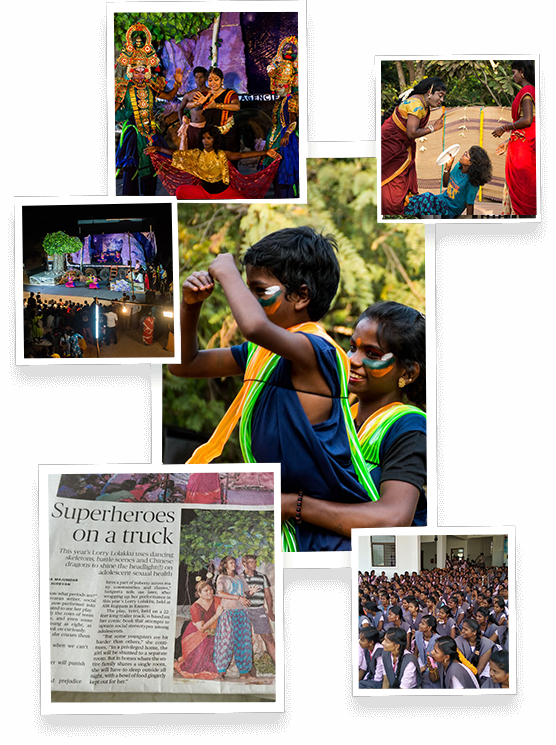
Our team of illustrators, facilitators, set constructors and Kattaikkuttu and Bharatanatyam performers worked very hard to create an amazing, interactive show that was enjoyed by more than 4,150 people, creating an enormous amount of awareness in the underprivileged communities of North Chennai, Kanchipuram and Ranipet district. The funny skeleton song about menstruation, the interactive gender games, the enormous snake puppet strangling patriarchy were some highlights of the show. (Check out the links below).
The scripts and songs were written in Kattaikkuttu style, ranging from comedy to serious messages of gender equality. We created the set design along with a team of talented artists that work in Tamil films headed by Surenderan. We ran our workshops with the youth of North Chennai, in partnership with Arunodhaya Centre for Street & Working Children and youth from Kalavai Kootroad. In the workshops, we spoke about gender, reproductive health, gender based violence and equal opportunity through the songs from the script of Lorry Lolakku and the story of the comic book. Youth contributed their views of how they see these realities and challenges. Our dance theatre workshop gave them tools to articulate their aspirations and frustrations on topics like child marriage, menstrual stigmas, and lack of liberty to achieve their hopes and dreams. They also had a lot of fun working with our giant snake and skeleton puppets, creating amusing alien characters and experimenting with Kattaikkuttu mask paints, alien and superhero costumes.

Through the workshops, we naturally came to an understanding that each one of us can fight, even in the smallest ways, against the repression of gender stereotypes forced on us by society. Hence our catchphrase - “The smallest flame can dispel the deepest darkness.”
When the show went on the road, it performed to huge crowds and rave reviews, generating a lot of goodwill from local government bodies, police and community heads as well as the local populace, who recognised the importance of the work we did.
Here are some quotes from the teenagers attending the workshops:
“I didn’t realise how hard it must be to be a girl. And I’ve never had girls as friends before.”
“Nobody else talks to us about these issues whether we are talking about periods or falling in love, having crushes.”
“Nobody told us that what we are going through is normal [as a teenager]. It makes me happy to talk without being judged.”
“Girls are expected to keep quiet about their problems.
The team performed at a number of schools and colleges where we had a very large audience of students, all from rural / underprivileged backgrounds. The impact created was far beyond our expectations. For instance, when we performed at Wisdom College, we were aware of the challenges of retaining girls in colleges, hence our performance took on new meaning as we spoke about equal opportunity, child marriage and gave them various telephone numbers of authorities they could contact for help. At the end of this performance, the crowd refused to stop interacting with the performers and we witnessed the triggering of more such awareness building conversations. Many of them told us they were inspired by this performance and we truly hope that they find the strength to fight for their futures.
Some comments by the young women in the audience include:
“I know what you mean about periods. I’m treated like a dog, like an unwanted thing, at home during this time…I want to do my part to fight against the stigma now.”
“Many of us have already had our marriages arranged, even if we don’t want it. Can you tell us how we can talk to our parents about it?”
We are very grateful to BookASmile; without their support we could not have achieved our goals to work in innovative ways to further the cause of gender equality, reproductive health and fighting against gender-based violence.
A more detailed description of the specifics of this event can be found in our Annual Report:
Get a glimpse of some of the attractions of the event, below. Don't forget to hit like and please subscribe to our YouTube channel: Katradi - Bridging the Gaps
Stigma around menstruation
This short clip depicts a girl expressing the slew of troubles she is faced with as a result of society's poor understanding of the "issue" of menstruation. The stigma that unfortunately plagues this topic hits home for a lot of young women who are subjected to shame and disgrace even by their nearest and dearest.
Gender Stereotypes game
This is a lovely clip of an emcee engaging the audience in an exercise which calls to attention how deeply ingrained our minds are with gender stereotypes. The first step to breaking such unnecessary, impractical social constructs is to question them, which is what we see happening here.
Funny Skeleton song about menstruation
This beautiful performance underscores the importance of normalising biological functions. The actors spotlight our conditioned minds by having open, inclusive discussions about what are considered taboo topics. The dialogues feature de-stigmatising conversations around bodily fluids and strive to build empathy for those who are subjected to dishonour and condemnation for being only human.
Evil Prince's view on women
This particular clip features a chauvinistic protagonist who speaks of gender stereotypes, with a focus on the role of women, not just in society at large but also in their own homes. It employs satire to highlight the dangers of a heavily patriarchal mindset with a view to subvert rather than uphold the status quo.
PRESS REVIEWS

Lorry Lolakku 2017: BTG Fellowship - Women's Empowerment
Katradi partnered with Transformational Sports to establish its first fellowship - the BTG fellowship aimed to promote community engagement and raise awareness about gender equality through sports and arts. As part of the fellowship, the selected fellows organised a unique community performance event inspired by an multi-gender ultimate frisbee game called Four Squares, using it as a tool to trigger deep conversations on gender equality and the profound challenges girls face growing up in India. How can we level the playing field?
Twenty-one fellows were carefully chosen from various NGOs across India, specifically those working with teenage populations and sharing an interest in using sports as a tool for fostering gender equality. These fellows underwent immersive training through a dynamic four-session programme focused on sports, theatre games and gender. Equipped with knowledge and skills, the fellows returned to their respective hometowns with the goal of teaching a minimum of 100 school students each. They delivered a curriculum that combined Ultimate Frisbee training with activity based discussions on important gender-related topics such as sex, gender stereotypes, reproductive health, media representation, and gender-based violence.
The teenagers enthusiastically crafted numerous posters inspired by their engaging discussions on gender equity, gender-based violence, and equal opportunity. They organised processions that traversed their villages, accompanied by vibrant drumming and dancing, honoring their cultural traditions.
The fellows also conducted one outreach event, the interactive Lorry Lolakku performance, to encourage their students to open discussions in the community on gender. These community performances were conducted in multiple cities, including Chennai, Surat, Pune, and Hyderabad. Its impact was far-reaching, touching the lives of more than 3,000 youth and young adults who actively participated in the events and engagements organised by the fellows. Through this innovative approach, the fellowship successfully raised awareness about gender equality, leveraging the power of the sports and arts to instigate positive change in communities across India.
Lorry Lolakku 2016: Street Children & Substance Abuse The Real Yama
In October 2016 during the Joy of Giving week (Daan Utsav), Katradi partnered with Arunodhaya Centre for Street and Working Children to create a performance with the boys from their shelter home in Korukkupet, Chennai.
Most of the boys are rag-pickers in the kilometer-long Korukkupet garbage dump and regularly use local drugs. Prolonged drug use by the boys and their parents has impacted the health of some, impaired speech of others, and above all created a violent atmosphere where they live.
The performance opened up strong discussions on how the boys see themselves, what they need to learn and what they want for their future. During our sessions the boys realised they wanted to talk about substance abuse - something which has affected them deeply. They created a performance out of their experiences and stories using Kattaikkuttu as the theatrical medium. The sets were built on a small lorry and the boys performed with a team of Kattaikkuttu artists through Korukkupet and Ennore.

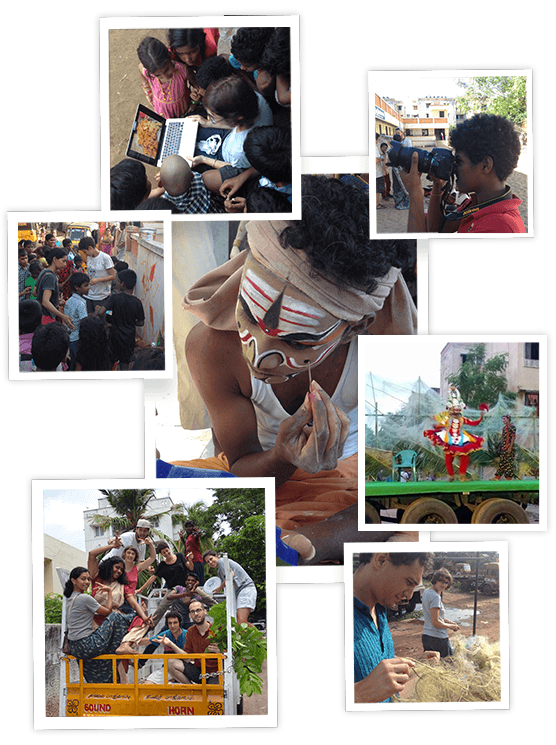
Mega Lorry Lolakku 2015: Microhistories Of Madras
In 2015, the first Lorry Lolakku project was launched in collaboration with a French art collective called Les Poussières. Six members of the collective visited India and were inspired by the fisher communities in North Chennai, who had been relocated after the 2004 Tsunami.
Sangeeta, while working in Oorur Kuppam, discovered that while the term Kuppam currently carries a derogatory connotation, it originally denoted a fishing village, symbolising the deep respect once accorded to the fisher community. She realised that the fisher community's social status had diminished, and some Kuppams had even changed their names to distance themselves from the stigma. This initiated a collective effort to obtain narratives from Kuppams along the Madras coastline, where their temples and sacred spaces stood as cultural landmarks.
The fisher communities had suffered from the loss of fish and crab species due to industrial pollution. Motivated by their plight, more stories were collected, and the French artists used recycled materials to create art. They salvaged items like old nets, bamboo poles, and thatch from garbage dumps. This approach sparked conversations about recycling, pollution, and the importance of protecting the environment. The community was amused and inspired by seeing discarded items transformed into something beautiful, accompanied by the captivating tales of the Kuppams.
The entire Lorry Lolakku set was built on a 20-foot lorry, showcasing the art of recycling. Bamboo poles and fishing nets were used to create a visually stunning display. Kattaikkuttu artists took the stage, sharing enchanting stories about the fishing villages, sacred spaces, and marine life. The performances evoked a range of emotions, from bittersweet tragedy to comedic irony, such as the futile attempts of the ‘kattiyakaaran’ (jester) to fish in a polluted sea.
During the project, there were some unexpected incidents. In one instance, frustrated individuals, who had been consuming alcohol all day, threw stones at the truck due to a power outage. This incident prompted a dialogue with a police official about the urgent need to create safe spaces, considering the area's history of violence and substance abuse. The encounter, though challenging, marked the initial connection with the communities of North Chennai and set the stage for enduring relationships with NGOs and other marginalised communities in the region.
The inaugural Lorry Lolakku performance revealed a stark reality: numerous areas in Madras lacked access to the enchanting art forms that define Indian culture. Ironically, Madras, renowned for its cultural heritage and distinguished as a UNESCO-declared city of intangible music and dance traditions, harbored communities devoid of such artistic experiences. Thus, a firm commitment was born - to bring mesmerising art to marginalised spaces while simultaneously addressing pressing issues of social justice and identity.
